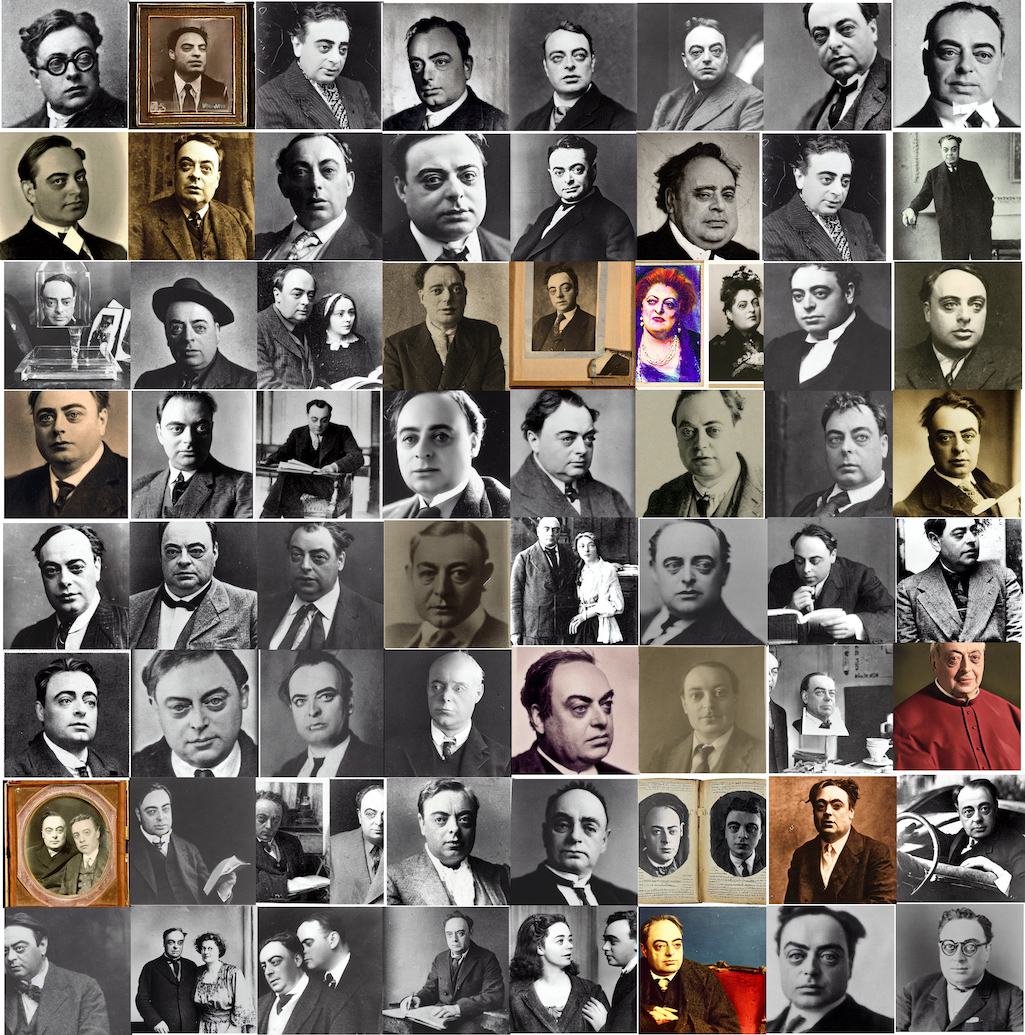Poems by Franz Werfel
Translated by James Reidel

Montage assembled by James Reidel from images generated by Stable Diffusion.
Translator’s Note: Franz Werfel was an inveterate drinker of Viennese espresso and chain smoker of Virginia cigars and cigarettes. He did so to write throughout the night and his indulgences allowed for him to live over 100 years in nearly half that time and leave behind hundreds of poems. Here Werfel (1890-1945) could meditate over our temporal existence and the meditation began early. Several of these poems cover Werfel’s years in Prague, before he relocated to Vienna via Leipzig and the publishing house of Kurt Wolff. “The Burgheress’s Grave,” which dates from 1909, is dedicated to the writer Max Brod, whose “Prague Circle” included several younger German Jewish writers, including Werfel and Franz Kafka. Another poem that deals with our ephemeral existence is “As Your Approaching Death Gave Me Bliss,” but here he chastises himself because a “good death” obscured his political stance: the young Werfel was a socialist and likely remained one in his Jewish and Catholic closets.
Werfel also worshipped women. After Brod, he fell under the spell of Otto Gross. But even before the renegade Freudian’s influence, Werfel saw a certain power. “The All-Girl Band” is another pre-First World War poem and the irony here is that the entertainers—a novelty in 1913 that one might see performing in a spa pavilion, a dance hall, restaurant, or under a bandstand in a city park—don’t play very well. And here Werfel inhales them—with his cigarette smoke.
Other poems are personal, autobiographical, existential. “Interurban Conversation” also harkens back to Werfel’s Prague but the conceit isn’t ordinary long-distance telephone service, which was still new during the first decades of the twentieth century. The call Werfel makes is really memory and liminality. And in another early poem, “Satan,” there really is a presence that has crossed over into our world.
Such a poem hardly anticipates Werfel as the “man of faith,” a throwback Jewish apostle capable of writing the longest poem in this group, “Jesus and the Carrion Path,” based on a Bahá’í parable. Werfel also allowed for the sacred and profane to coexist in his verse. This pagan Werfel seems to surface in “Vision of the Doe,” a poem that may be an erotic evocation to Alma Mahler, written in the very late teens or early twenties, after Werfel stole her away from Walter Gropius.
Other poems, obviously, come later in Werfel’s career. “The Greatest German of All Time” is a bardic curse upon the German people for supporting Hitler. “Dream City of an Emigrant” still has all the fear of making a border crossing out of Europe in 1940.
I could go on—and I don’t want to date Werfel needlessly. That said, there are notes appended to the poems when some intercession from this time traveler is helpful. Even Dante needed a guide.
— James Reidel
Schulgang
> Way to School
Als mich dein Wandeln an den Tod verzückte
> As Your Approaching Death Gave Me Bliss
Das interurbane Gespräch
> Interurban Conversation
Strassenaugenblick
> Glancing Moment in the Street
Die Damenkapell
> The All-Girl Band
Das kleine Trübe bin ich
> The Small Blot That I Am
Jesus und der Äser-weg
> Jesus and the Carrion Path
Nicht einmal Zweifel
> Never Any Doubt
Das Durcheinande
> Chaos
Lied von der Sucht
> Song of Dipsomania
Die Hasser
> Haters
Sequenz von den Schritten
> Sequence of Steps
Dunst über Frankreichs Flur
> Mist over France’s Corridors
Satan
> Satan
Der größte Deutsche aller Zeiten
> The Greatest German Ever
Traumstadt eines Emigranten
> Dream City of an Emigrant
Hymnus an die Vögel
> Hymn to the Birds
Vision von der Hirschkuh
> Vision of the Doe
Die unmerkliche Fortschreitung
> The Imperceptible Progression
James Reidel has published poems in many journals and is the author of two collections of verse. He is also the biographer of the poet Weldon Kees and is currently compiling and annotating Kees’ lost diaries and unpublished poems. Examples of the latter were recently published in Beatdom, Evergreen Review, and The Abandoned Playground. His latest book, Manon’s World (Seagull Books, 2021), is about the life and death of Manon Gropius, the “angel” of Alban Berg’s Violin Concerto and the revenant muse of Franz Werfel in more than one of his novels.
Copyright © Mudlark 2023
Mudlark Home Page